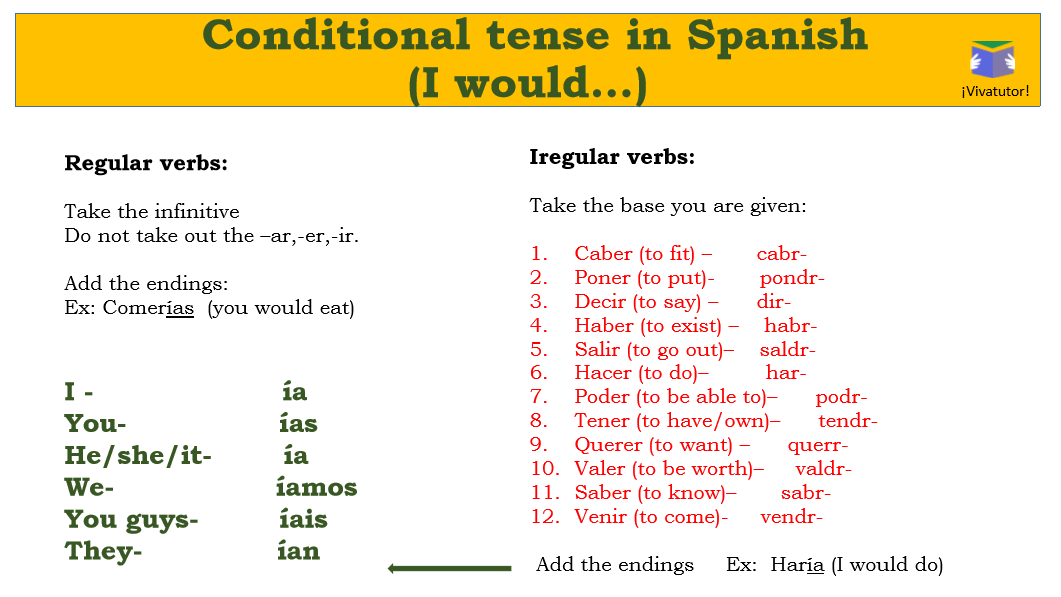Would, could, should in Spanish

Today we're going to see how to say that you would do, could do or should do something in Spanish, and all of them have the same endings! Let's see!
Would
We achieve this using the conditional tense, which you can check on this post.
In the grid below you can see how to form it too!
You can see that with most verbs we just need to add the endings "-ía, -ías, -ía,- íamos, -íais, ían" to the infinitive. With the irregulars, you take the irregular ending and add the ending to it.
Ex:
Prepararía una paella pero no tengo arroz - I would prepare a paella but I don't have rice.
Tendría una mascota pero no tengo tiempo - I would have a pet but I don't have time.
Should
We get "should" from "deber" also with the conditional endings that we just saw:
Yo debería
Tú deberías
Él/ella debería
Nosotros deberíamos
Vosotros deberíais
Ellos deberían
To that, you add the infinitive of the second verb:
(Yo) debería estudiar un poco más- I should study a bit more.
Deberíamos ayudar a la protectora - We should help the shelter.
¡Deberíais venir a comer un día! - You guys/all should come for lunch one day!
Pienso que deberían considerar todo - I think they should consider everything.
An example of "should be":
No te preocupes, debería ser fácil - Don't worry, it should be easy.
Could
Here there is a bit of a problem, because English uses "could" for two things:
1- to talk about the past, as a "was able to", "had the option to"...
2- would be possible, would be able to happen hypothetically.
Could - in the past
This would be the verb "poder" (to be able to) in past tense.
Usually it'd be in imperfect (click here to know more about imperfect).
The endings are exactly the same as in conditional (ía,ías...) however we take the -ar/er/ir ending out first.
Yo podía
Tú podías
Él/ella podía
Nosotras podíamos
Vosotros podíais
Ellos podían
and then add the infinitive to it.
No estaba preocupada porque podía coger más tiempo - I wasn't worried because I could/was able to take more time.
Podíamos pasear por la playa porque vivíamos cerca - We could walk on the beach because we lived close.
Podían ayudar pero no lo hicieron - They could help but they didn't.
However,we could need past preterite instead, if the action happens at a very specific time and duration.
You can learn more about preterite, imperfect and past tenses in general and when to use each here.
Yo pude
Tú pudiste
Él/ella pudo
Nosotros pudimos
Vosotros pudisteis
Ellos pudieron
No pude contarle la verdad - I couldn't tell him the truth (in that specific situation, close to "I didn't tell him")
Querías dejar tu trabajo pero no pudiste - You wanted to leave your job but you couldn't.
Could- hypothetically
Here we would also use "poder" in conditional:
Yo podría
Tú podrías
Él/ella podría
Nosotros podríamos
Vosotros podríais
Ellos podrían
and the infinitive afterwards of the second verb:
¿Podrías venir mañana? - Could you come tomorrow?
¡Podríamos ir al río un día! - We could go to the river one day!
An example of "could be":
¡Podría ser divertido! - It could be fun!
Practice
¿_______ hacer esto por mí?
¿Could you do this for me?Arreglar la televisión ________ ser fácil
Fixing the tv should be easy________ ir al restaurante y quedar con algunos amigos.
We could go to the restaurant and meet some friends__________ estar jugando fuera
They should be playing outsideAntes ________ leer durante horas, pero ahora te aburres
You could read for hours before, now you always get boredSu perro _____ correr muy rápido así que nos asustamos
Their dog could run super fast, so we got a bit scared¿No __________ estar estudiando?
Shouldn't you be studying?Pienso que ___________ ir a visitarlo
I think we should go visit him.
Sol: podrías/debería/podríamos/deberían/podías/podía/deberías/deberíamos
And that's the end!
¡Hasta la próxima! :)
